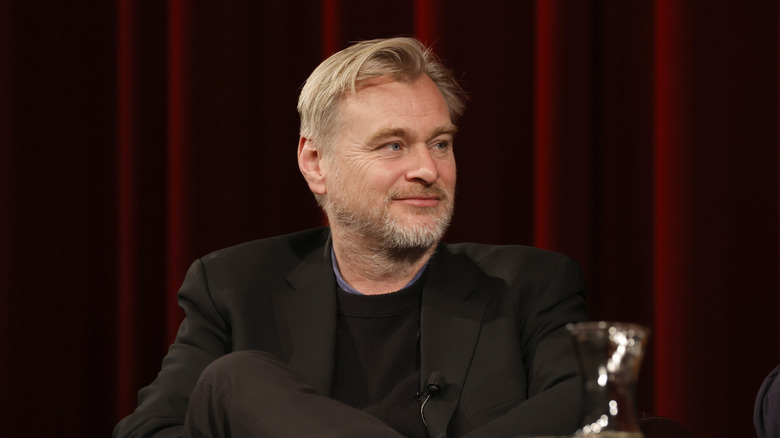Why Tenet's Plot Is Confusing, According To Christopher Nolan
Christopher Nolan knows the plot of "Tenet" broke your brain, and he doesn't care. When it comes to blockbuster auteurs, Nolan is one of the few mainstream directors who doesn't like to hold his audience's hand, putting experience over interpretation or conclusion. Known for his complex, thought-provoking films, like "Inception" and "The Prestige," Nolan can often alienate viewers because of his films' convoluted worldbuilding and use of interesting storytelling devices. And with an obsession with the concept of time running throughout his films, it's very easy to feel overwhelmed and confused by the end of the picture.
For Nolan, this is a feature, not a bug. When "Tenet" debuted in 2020, it seemed to be Nolan's most indulgent and audacious film, packed with time travel and downright nonsensical story beats. The film's complexity has become a running joke in the cinephile community. While chatting with Nolan, late-night host Stephen Colbert candidly asked the director if even he understands "Tenet," arguably the British director's most inaccessible film. "You're not meant to understand everything in 'Tenet,'" the director bluntly said. "It's not all comprehensible. It's a bit like asking if I know what happens to the spinning top at the end of 'Inception.'"
"Tenet" is still a huge question mark in Nolan's filmography considering just how perplexing it is. The film follows a CIA agent known only as "the protagonist" (John David Washington), who investigates the origins of objects that travel backward through time. While it does have its fair share of fans (and has exploded in popularity following its release), it stands as Nolan's lowest-rated film on Rotten Tomatoes, with a 69% critics' score.
Christopher Nolan wants viewers to experience his films, not understand them
In a review for Looper's sister site /Film, Jason Gorber called "Tenet" the "most Nolan-y of Nolan's own films, amping the many quirks of this remarkable filmmaker's visual, aural and temporal fetishes up to 11." The positive review described it as "messily entertaining." While the film does have its fans, it's also sparked a considerable amount of backlash, thanks in part to its sound mixing, which can leave dialogue inaudible, forcing audiences to miss key exposition points. Nolan has since said that his sound mixing is a deliberate decision to create a more visceral experience.
For Nolan, the most important thing is experience with a capital E. When asked by Stephen Colbert if his films had any meaning and if the director prioritized the cinematic experience above understanding films, the filmmaker said he preferred the latter. "If you experience my film, you are getting it — I feel very strongly about that," the director said. "Where people encounter frustrations with my narratives in the past, sometimes I think they're slightly missing the point. It's not a puzzle to be unpacked."
It's sort of hilarious how "Tenet" has been heralded as this herculean film that has to be unpacked when the picture features dialogue that explicitly tells the audience to focus on the experience, not the logic. "Don't try to understand it; feel it," says Clémence Poésy's scientist in the film as she tries to explain the idea of moving objects back through time. That suggestion obviously went over the heads of some viewers, including Christopher Nolan's own Peloton instructor, who said, "You need to be a neuroscientist to understand [it]."

